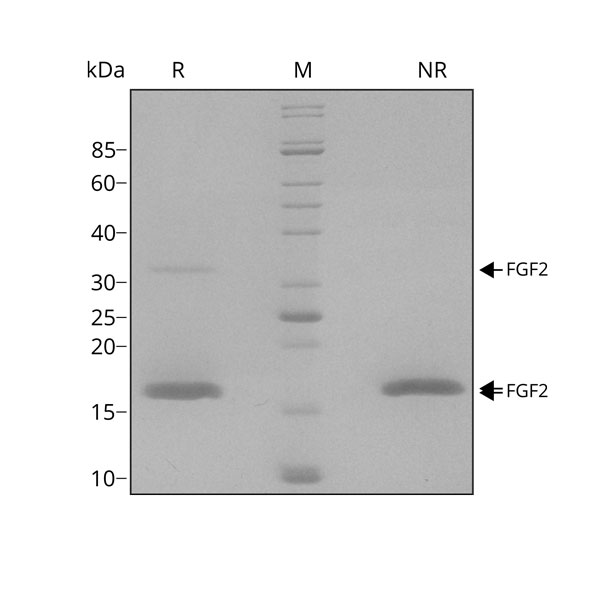 Recombinant human FGF-2 (145 aa) protein (Qk025-CTG)
Recombinant human FGF-2 (145 aa) protein (Qk025-CTG)Recombinant human FGF-2 (145 aa) protein (Qk025-CTG)
Price range: £1,000.00 through £1,470.00
Human fibroblast growth factor 2 (FGF-2/bFGF) protein (145 aa) is our gold-standard and recommended FGF-2 / bFGF protein for induced pluripotent stem cell (iPSC) and embryonic stem cell (ESC) maintenance, and iPSC and mesenchymal stem cell (MSC) proliferation and differentiation.
Our highly pure and bioactive cell therapy grade 17 kDa FGF-2 protein animal origin-free (AOF) and carrier protein-free (CF) comprising the core structured region (145 aa) sufficient for full biological activity.
Qkine cell therapy grade high purity animal origin-free proteins are manufactured as GMP grade equivalents in an ISO 9001:2015-certified facility, under ISO 20399:2022 standards with GMP compliance, defined quality criteria and documentation.
This product is available to order now and will be in stock soon, please contact us for the estimated lead time customerservice@qkine.com
In stock
Orders are typically shipped same or next day (except Friday).
Easy world-wide ordering, direct or through our distributors.
Price range: £1,000.00 through £1,470.00
Buy online with secure credit card or purchase order. For any questions, please email orders@qkine.com
Summary:
- High purity human FGF-2 / basic FGF, 145 aa form comprising residues 144-288 (Uniprot: P09038)
- 17 kDa
Certified animal origin-free (AOF)
Cell and gene therapy grade
Manufactured in our ISO 9001:2015 facility in Cambridge, UK
Lot-to-lot consistency in bioactivity
Full traceability and documentation
Carrier protein-free, tag free
Expressed in E. coli
Lyophilized from Tris, NaCl, CyS, mannitol
- Resuspend in sterile-filtered water at >50 µg/ml, add carrier protein if desired, prepare single use aliquots and store frozen at -20 °C (short-term) or -80 °C (long-term).
Featured applications:
Neural stem cell (NSC) therapy
Regenerative stem cell therapy
Pluripotent stem cell therapy

FGF-2 activity was determined using the Promega serum response element luciferase reporter assay (*) in transfected HEK293T cells. Cells were treated in triplicate with a serial dilution of FGF-2 for 6 hours. Firefly luciferase activity is measured and normalized to the control Renilla luciferase activity. Data from Qk025 lot #204706. EC50 = 239 pg/ml (14 pM).
FGF-2 migrates as major band at 17 kDa in non-reducing (-βME) conditions and upon reduction (+βME). The higher molecular mass band at 35 kDa is a dimer that we always see in our highly purified human FGF-2, the presence of this does not affect biological activity. Purified recombinant protein (7 µg) was resolved using 15% w/v SDS-PAGE in reduced (+β-mercaptothanol, R) and non-reduced conditions (NR) and stained with Coomassie Brilliant Blue R250. Data from Qk025 lot #014

Further quality assays
Mass spectrometry: single species with expected mass
Purity >98%, by SDS-PAGE quantitative densitometry
Recovery from stock vial: >95%
Sterility tested and mycoplasma negative
Endotoxin: <0.005 EU/μg protein (below level of detection)
Residual host cell protein <10 ng/µg
Residual host cell DNA <10 ng/μg
N-terminal sequence analysis
We are a company founded and run by scientists to provide a service and support innovation in stem cell biology and regenerative medicine. All our products are exceptionally high purity, with complete characterisation and bioactivity analysis on every lot.
Protein background
Fibroblast growth factors (FGFs) are a family of growth factors which regulate a wide range of essential biological functions including cell proliferation and survival, migration and differentiation [1]. The human FGF family has 18-22 members grouped into 6-7 subfamilies based on sequence homology and phylogeny [2]. The FGF family of growth factors have critical roles during both vertebrate and invertebrate embryonic development, in adult cells they modulate tissue maintenance, wound healing and angiogenesis [1,2].
The FGF ligands bind to 4 receptors (FGFR1-4), transmembrane receptors with intracellular tyrosine kinase activity [2, 3]. Once activated FGFRs recruit Src homology-2 (SH2) or phosphotyrosine binding (PTB) domain-containing signaling proteins leading to activation of intracellular signaling pathways [1]. The main signaling pathways activated by FGF binding are the RAS/MAP kinase pathway, PI3 kinase/Akt pathway, and PLCγ pathways [1-3].
Fibroblast growth factor 2 (FGF-2) also known as basic fibroblast growth factor (bFGF) has a broad range of physiological roles including regulation of cell growth, survival and proliferation. FGF-2 is one of the FGFs which binds to and signals through all four of the FGFRs [4].
FGF-2 is an essential growth factor for the maintenance of pluripotency in human embryonic stem cells (ESCs), induced pluripotent stem cells (iPSCs) [4] and mesenchymal stem cells (MSCs) [5]. FGF-2 preserves pluripotency through interaction with PI3 kinase/Akt, ERK1/2, JAK/STAT and PLCγ pathways by activation of activin A. In feeder culture systems FGF-2 stimulates production of essential growth factors and cytokines from the feeder layer [5].
Additional resources
FAQ
Fibroblast growth factor 2 (FGF-2), also known as basic fibroblast growth factor (bFGF) is a growth factor and signaling protein.
FGF-2 is expressed in a developmental and tissue specific manner. It’s expression is tightly controlled in normal tissues and it can be detected in all major tissues.
FGF-2 is essential for normal embryonic development. It has roles in cell survival and proliferation, angiogenesis, tumorigenesis, wound healing and tissue repair.
FGF-2 binds to and signals though all four of the FGF receptors FGFR1-4.
FGFRs phosphorylate specific tyrosine residues and activate the RAS-MAPK, PI3K-AKT, PLCγ, and STAT intracellular signaling pathways.
FGF-2 is used to maintain the pluripotency of stem cells in culture.
Our products are for research use only and not for diagnostic or therapeutic use. Products are not for resale.
For use in manufacturing of cellular or gene therapy products. Not intended for in vivo applications.

Receive an Amazon gift voucher when you leave us a review.
£25, $30 or €30 for reviews with an image and £10, $15 or €15 for reviews without an image
